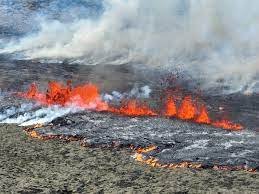
An eruption has occurred in an uninhabited valley near the Litli-Hrútur mountain, approximately 30 kilometers (19 miles) southwest of Reykjavik, the capital of Iceland. Authorities in Iceland have issued warnings to tourists and spectators, urging them to stay away from the newly erupting volcano, which is spewing lava and noxious gases from a fissure. The eruption began on Monday afternoon following a series of thousands of earthquakes in the area, according to meteorological authorities. This event comes 11 months after the previous eruption officially ended.
The eruption site, known as Fagradalsfjall volcano, is located close to Keflavik Airport, Iceland’s international air traffic hub. However, flights have not been disrupted, and the airport remains open. The Icelandic Meteorological Office reported that the current eruption was initially more explosive than the previous two occurrences. Aerial footage captured the sight of orange molten lava streaming and clouds of gases emanating from a winding fissure measuring about 900 meters (half a mile) in length.
Due to the high levels of gas pollution around the eruption, the Met Office has advised travelers not to enter the area until conditions have been assessed by responders. By Tuesday morning, the size of the fissure and the intensity of the eruption had decreased, according to scientists. Professor Magnús Tumi Guðmundsson, a geophysics expert from the University of Iceland, stated that the eruption has become relatively small, which is considered positive news. Although the eruption may last a considerable period, it is not expected to continue with the same magnitude as witnessed in the initial hours.
In 2021, the same area experienced an eruption that resulted in spectacular lava flows lasting several months, attracting hundreds of thousands of visitors. Iceland, located above a volcanic hot spot in the North Atlantic, typically witnesses eruptions every four to five years. The most disruptive eruption in recent history occurred in 2010 when the Eyjafjallajokull volcano spewed massive ash clouds into the atmosphere, leading to widespread airspace closures over Europe. More than 100,000 flights were grounded, causing significant travel disruptions and concerns about potential engine damage from the ash particles.
Given the current eruption’s hazardous conditions and the potential risks associated with volcanic activity, authorities have emphasized the importance of respecting safety measures and staying away from the affected area.
Sources By Agencies

